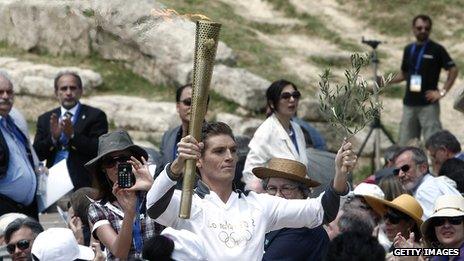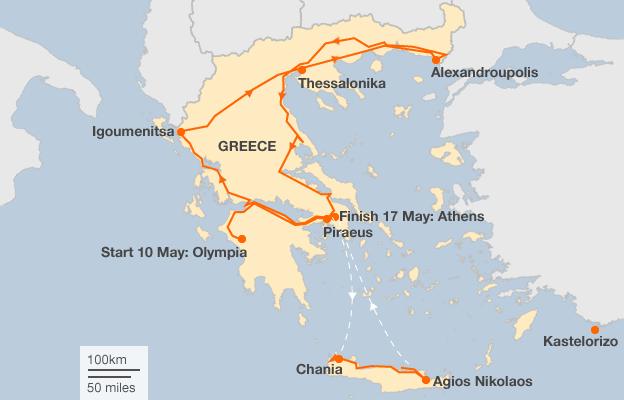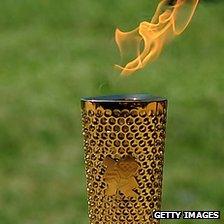London 2012: Olympic Games flame lit in Greece
- Published
- comments
Lord Coe: ''Through this unique location we are able to connect the ancient Games and the modern Games''
The flame for the London 2012 torch relay and Olympic Games has been lit during a ceremony in Olympia, Greece.
It was kindled by actress Ino Menegaki, playing a high priestess, who caught the sun's rays in a parabolic mirror.
The flame went out briefly before being relit and transferred to the first torchbearer. The ceremony took place amid the Temple of Hera ruins, by the ancient Olympic Games stadium.
The flame flies to Britain on Friday 18 May for a 70-day relay around the UK.
At the temple ruins, actresses playing Olympic priestesses danced and men dressed as heralds put on a display symbolising athletic strength before the fire was ignited using the mirror.
Olympic torch goes out
The flame - an Olympic symbol meant to represent purity because it comes directly from the sun - was placed in an urn and taken to the stadium where the ancient Olympic Games were held.
It was transferred to a Greek torch which then "kissed" the London 2012 torch of Liverpool-born Greek world champion 10km swimmer Spyros Gianniotis.
He began to run with it on the first leg of its week-long journey around Greece.
Our correspondent James Pearce reported that the flame briefly went out while being held in an archaic pot at the side of the stadium, but the ceremony passed otherwise without incident in a country battling political and economic turmoil.
Chairman of the London games organisers, Locog, Lord Coe, International Olympic Committee president Jacques Rogge and Hellenic Olympic Committee president Spyros Capralos were in Olympia for the moment that marks the countdown to London 2012.
Lord Coe told the BBC: "Today is the rallying call to the athletes - the best athletes of their generation - to come to London. That in itself is a big moment because it's the biggest sporting event in the calendar."

Liverpool-born Greek swimmer Spyros Gianniotis was first to run with the torch
In his speech to assembled Greek and Olympic dignitaries and a crowd gathered on the slopes of the stadium he said: "We are reminded this morning of sport's enduring and universal appeal, and the timeless Olympic values that transcend history and geography; values which, I believe, in these challenging times are more relevant than at any time before and particularly to young people the world over.
"In 1948, shortly after the Second World War, my predecessor stood where I am today and made the first tentative steps in turning the world from war to sport.
"We find ourselves in challenging times again and turn to sport once more to connect the world in a global celebration of achievement and inspiration."
'Peace symbol'
Mr Rogge said that like the messengers in ancient times who shared news of the Olympic truce - the laying down of arms for the Games - "the torchbearers who carry this flame to London will spread the message of sport's capacity to promote peace and to make our world a better place".
He said: "We have come to the ancestral home of the Olympic movement to light a flame that will soon cast its glow over the entire world.
"The flame that we kindle here, from the pure rays of the sun, is a powerful symbol of the tradition and values that underlie our movement.
"It is a beacon for the Olympic values of friendship, excellence and respect... a symbol of fellowship and peace."

The flame passed to first British torchbearer, Alex Loukos, with a torch "kiss"
First torchbearer Mr Gianniotis passed the torch on to Alex Loukos, 19, the first British torchbearer, a boxer and, in 2005, one of a delegation of east London schoolchildren who travelled to Singapore as part of London's final bid for the Games.
Mr Loukos said: "It feels like I'm coming full circle.
"I went out to Singapore and now I'm here, sort of kicking it off. It's a big honour and a privilege and I'm just trying to take it all in."
The torch is due to travel 2,900km (1,800 miles) through Greece, carried by 500 torchbearers, on a route circling the country and travelling out to the islands of Crete and Kastelorizo.

The Greek relay starts in Olympia and finishes in Athens, taking in Crete and Kastelorizo
Greece has seen huge demonstrations of social unrest in previous months, sparked by financial chaos and efforts to reach a deal with the European Union on a bail-out for its economy.
Talks to try to form a new government have been ongoing since elections on Sunday failed to produce a conclusive result.
And while Olympic leaders gathered for the pristine ceremony on Thursday, the economic crisis has hit Greek sport and games preparation.
Some Athens 2004 venues have fallen into disrepair and the country's athletics federation has suspended domestic events amid severe national funding cuts.
Several international companies including BMW have stepped in to help fund the torch's journey around Greece.
The Greek leg of the 2012 torch relay ends at the Panathenaic Stadium, Athens, on Thursday 17 May, where the flame is handed over to London Olympic Games organisers.
The stadium hosted the first modern Olympic Games in 1896.
The last torchbearers in Greece will be Greek weightlifter Pyrros Dimas and Chinese gymnast Li Ning - who lit the cauldron at the Beijing 2008 opening ceremony.
The 2008 Olympic torch relay, which travelled the globe, was dogged by pro-Tibet, democracy and anti-China protests.
The 2012 flame will travel straight from Greece to the UK on 18 May, flying into the Royal Navy airbase at Culdrose, near Helston in Cornwall.

The torch will travel 1,800 miles through Greece and 8,000 in the UK
The UK torch relay begins at Land's End the following morning when three times Olympic gold medal-winning sailor Ben Ainslie will be the first to carry the torch on British soil.
He wrote in the Daily Telegraph: "It is a privilege for me to be asked but, more than anything, it is an exciting moment for the country.
"The arrival of the torch on home soil really brings home how close the Games are."
Olympic gold medal-winning track cyclist Sir Chris Hoy will carry the Olympic flame in Manchester on 23 June, he announced on Twitter.
Carried by 8,000 torchbearers, the Barber Osgerby-designed torch will cover 8,000 miles across all of the country's nations and regions.
It is due to reach the Olympic Stadium in Stratford on 27 July to light the cauldron at the opening ceremony of the Olympic Games.
For the ancient Greeks, fire was a divine element believed to have been stolen from the Gods.
A flame was first lit at the modern Olympics at the Amsterdam 1928 summer games, but it was not until Berlin 1936 that a torch relay route was set out from Greece to Germany.
- Published7 May 2012
- Published30 April 2012
- Published27 March 2012
- Published9 May 2012